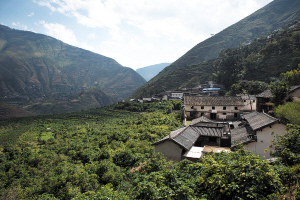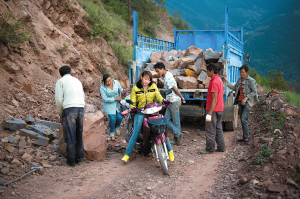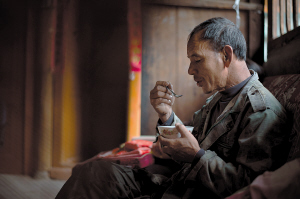The oldest coffee in China, Zhu Kula Coffee.
After CCTV broadcast the news that Starbucks Coffee is making high profits in China, drinking coffee as a kind of living consumption soon aroused heated discussion. Starbucks, which has always been famous for its high-end coffee brand, has been crowned with the halo of "taste", "petty bourgeoisie" and "high-end consumption". Behind the controversy about consumption habits and high prices, it actually reflects the competitive disadvantages of domestic coffee brands, even if the quality is high and the price is low, it is still unable to guide the domestic coffee market.
Yunnan has always accounted for 98% of domestic coffee cultivation and has several coffee brands. Although Zhukula Coffee, which comes from Binchuan County, Dali, Yunnan Province, has been proved to be the oldest coffee in China, it has only begun to be understood by people in recent years. The coffee industry, which only relies on 24 century-old coffee trees and gradually started after a century, is trying to break out the siege and build its own brand under the background of overseas coffee brands guiding the domestic market.
A coffee village deep in the mountains
Zhukula Village is located in remote and blocked traffic, which not only preserves Zhukula Coffee in the long history, but also gives it a mysterious veil.
On October 25, Zhu Kula Village, Pingchuan Town, Binchuan County, Dali. The new season of coffee fruit has just begun to be picked.
Li Shuying, a 57-year-old villager, crouched in the field, holding the branches of the coffee tree in one hand, gently picking the coffee fruit in the other and putting it into a woven bag slung over his shoulder. After spending the whole morning, Li Shuying picked less than 10 kilograms of fresh fruit of coffee. This is not surprising, just in the picking season of coffee, only scattered mature red fruit dotted on the branches, a large number of green coffee fruit will ripen and turn red in batches over the next half a year.
Behind Li Shuying is a green coffee forest, which surrounds the village of Zhukula and connects it into one. The wooden plate standing at the entrance of the village gives Zhu Kula a good introduction: when you come to the mulberry quat tree in front of the mountain temple and look at the valley to the south, you can get a bird's-eye view of the small village inlaid at the foot of the mountain and nestled close to the banks of the Yupao River. This is Zhu Kula.
At first, Zhukula Village was not famous for its beauty. This small Yi village, with only 84 families and less than 400 people, is covered with halos such as "birthplace of Chinese coffee" and "living fossils". The powerful support of these halos is the patches of coffee forest that surround the village. With the existence of these halos, Zhukula Village and Zhukula Coffee have gradually come into people's view in recent years.
From the map, Zhukula Village happens to be located at the junction of Chuxiong, Lijiang and Dali, which belongs to the dry and hot valley in the upper reaches of the Jinsha River. It is 51 kilometers away from Pingchuan town government and 108 kilometers away from Binchuan county seat.
The poor traffic condition in Zhukula village is famous throughout Binchuan, and even the people in the village are known as "99 bends and 88 ridges". The 51-kilometer road from Pingchuan town to the village is full of steep mountain roads and rugged earth and stone roads, with cliffs on one side and abyss on the other. The staff of the local forestry department, who often commute on this road, said: "Zhu Kula, no one goes in and no one will come out on a rainy day. Even on a sunny day, only off-road vehicles and motorcycles can pass through the 51-kilometer mountain road. It takes three hours one way."
On the morning of October 25, when the reporter was on his way to the village for an interview, he happened to meet a cadre of the Zhu Kula village committee riding a motorcycle to rush to the town for a meeting. "for the meeting tomorrow morning, you must come out of the village by this afternoon, or you will not be able to make it." Qi Ming of the Zhu Kula Village Committee said that the road entering the village was built a few years ago by companies that went to the mountains to engage in hydropower development, and only motorcycles and tractors were allowed in and out.
Perhaps it is because of its remote location, traffic congestion and the unique geographical location of Zhukula Village that Zhukula Coffee has been quietly preserved in the long river of history. And all this seems to cast a mysterious veil over Zhukula coffee.
During the interview, the reporter also heard a good news from the village committee. due to the popularity of Zhukula coffee and the needs of industrial development, the local government will begin to improve traffic conditions and harden the roads into the village.
A century of living habits
If drinking coffee is a taste of life in a coffee shop, then in Zhukula Village, it is a habit passed down by the villagers for a century.
Zhukula Coffee is famous for its coffee growing history. In 1892, in the 18th year of Guang Xu in the Qing Dynasty, French missionary Tian Deneng went to the village of Zhu Kula to carry out missionary activities. He planted a coffee seed from Vietnam on the edge of the church in the village. Inadvertently inserting willow into shade, no one thought that a coffee tree planted by missionaries had achieved Zhu Kula's century-old coffee classic. The seeds that fell from the coffee trees planted by the priest made a coffee forest grow around the church, which is the 24 century-old coffee trees that still exist in the village of Zhukula. Times have changed, and the coffee tree planted by Tian Deneng froze to death in the heavy snow in 1984, and only the mottled church still stands in the center of the village.
Since there are hundreds of years of coffee cultivation history, the history of Zhu Kula villagers drinking coffee has naturally gone through a hundred years of precipitation. On October 25, Qi civilization of the Zhukula village committee made a pot of coffee early. An ordinary kettle is a tool for making coffee. After cooking, shake it hard and pour it into the cup with the coffee powder. The coffee cup is the favorite coffee cup in the coffee shop in the city. It was thought that the local people also began to learn from the city people's taste in drinking coffee. Unexpectedly, Qi civilization said that we usually use coffee cups to drink coffee when guests come, and we usually use paper cups. Taste a few mouthfuls, although the taste is not as delicate and smooth as the coffee shop, but the strong coffee aroma has a long aftertaste.
Drinking coffee is a different feeling in the village. Zheng Shulian, 51, is the only teacher in Zhu Kula Village Primary School. In her home, the ground coffee powder is placed next to the TV set. She is used to calling coffee "coffee and tea", and whenever guests come, she always treats them with "coffee and tea". Put a small spoonful of coffee powder and a small spoonful of sugar into a paper cup, then pour it with boiling water, and a cup of instant coffee is made. Zheng Shulian said that Zhukula Village has an ancient way of making coffee, but during the busy farming season, few people have the time to make it slowly. Even coffee powder is now mostly processed by machines rather than stone mills.
"in Zhukula, drinking coffee is a habit, not as fastidious as it is in the city." Zheng Shulian married to this village from Sichuan and is one of only two Han Chinese in the village. To this day, she still remembers the first time she went to the village with her boyfriend 30 years ago, and the first sip of coffee was made for her by her neighbor next door. "No sugar, it's bitter, just like traditional Chinese medicine." Later, she found that as long as there was a wedding party in this village, there must be a pot of coffee on every table, and everyone drank it in a bowl.
Zheng Shulian also said that although the habit of drinking coffee in Zhukula village has been passed on for a long time, it has really become popular in recent years. "there used to be no roads here, so it was very poor. The villagers collected coffee beans, most of them saved up to sell, in exchange for some money to buy salt and other daily necessities. " In recent years, after the roads were opened in the village, the villagers could work at the hydropower station under construction on the Yupao River, and the crops in the village could also be shipped out for trading, so the economic conditions were slightly better. After the coffee beans are harvested every year, almost every family will leave a small part of it for drinking and entertaining guests.
In Zhukula, as long as they are guests from outside, no matter which villager's home they go to, the host will always make a cup of coffee. There is no milk, a spoonful of coffee powder, a spoonful of sugar, or a bowl or a paper cup, but these have no effect on the rich aroma of Jukula coffee. Perhaps, as Zheng Shulian said, drinking coffee here is just a living habit that has been passed on for a century and has nothing to do with sentiment or taste.
The turning point of "grassroots" coffee
With the unintentional actions of missionaries, ancient coffee trees that survived felling, and the influx of experts, the preservation of Zhukula coffee has always been described as "inadvertently planting willows."
Since the first coffee tree planted by French missionaries grew here, the village of Zhukula no longer seems to be inseparable from coffee. And Jukula Coffee has been growing silently here for a century. From the little-known "grassroots" coffee to the present fame, the story is more like a legend, with too many unintentional actions.
Jukula Coffee once had a period of prosperity. In 1948, Li Fusheng, the head of the old village of Zhu Kula, led 43 villagers to plant more than 80 mu of coffee forest. Now that Li Fusheng is 87 years old, his hearing in both ears is seriously impaired, it is difficult to communicate with the outside world, and that long history is difficult to restore. But since Zheng Shulian came to this village, Zhu Kula Coffee has also experienced ups and downs.
When Zheng Shulian came to Zhukula village, Li Fusheng led the villagers to plant coffee trees that were more than 30 years old, and almost all the coffee beans were purchased by supply and marketing cooperatives. Later, the land was sold to every household, and the coffee forest was distributed to all households in the village. As Zhu Kula is located at the foot of the mountain, land resources are scarce and there is not enough land for grain cultivation. "around 1988, the price of coffee beans was 2 yuan a kilogram." As the economic benefits of coffee trees are not high, many villagers began to cut down coffee trees in their fields and plant crops instead.
This continuous felling of coffee trees continued until 1997, when the director of the Civil Affairs Committee of Binchuan County, who was born in Zhukula, began to contact outside businessmen to buy coffee beans in the village. Zhukula coffee sold for 25 yuan a kilogram, an all-time high. But the good times only lasted a year or so, and the price of coffee beans hit rock bottom again. Until 2008, only 13 mu were left after the original coffee forest in Zhukula village was cut down.
Zheng Shulian could not remember the exact time, and a group of people from Kunming came to Zhu Kula to visit the church of that year. Among them are Chen Dexin, secretary general of Yunnan Fine Coffee Institute, as well as some experts. During the visit to the church, the coffee trees near the church attracted their attention. After learning about the history of coffee cultivation here and later various studies on coffee, the concept of "the earliest coffee tree in China" began to take shape. Later, a well-known coffee brand enterprise in Yunnan also began to make repeated textual research on Zhukula Coffee, coupled with the research conclusions of many experts, and finally determined that Zhukula Coffee is the oldest coffee in China.
Since then, both the government and coffee companies have begun to pay attention to this ancient village. Some coffee companies quickly reached an agreement with the local government that the company would be responsible for buying coffee beans produced in the village at a price as high as 50 yuan / kg. The promotion of "the oldest Coffee in China" made Zhu Kula famous overnight, and many foreign businessmen began to pay attention to Zhu Kula. In the market competition, the price of Zhu Kula's coffee beans has climbed to 80 yuan / kg today.
"Farmers always take the current economic benefits as the starting point, and did not see the development prospect of coffee at the beginning." Up to now, Zheng Shulian, like most villagers, began to feel sorry for the coffee trees that had been cut down in the past. Although a large area of coffee forest has been cut down, fortunately, 24 120-year-old trees in the villager Li Binxiang's land survived. Today, the 24 old trees have been listed for protection by the local authorities.
Throughout the history of the development of Zhukula coffee, from the unintentional actions of missionaries, to the ancient coffee trees that were luckily preserved, to the influx of experts, just like the song written by Binchuan County to promote Zhukula Coffee: an ancient romantic village, a missionary brought faith, a coffee tree is also slowly growing, a legend has been brewing. It was forgotten for a century. A church is still watching. Zhu Kula, Zhu Kula, inadvertently inserted willow into shade.
Ongoing brand building
Zhu Kula Coffee has become a business card publicized by Binchuan, and the joint protection and development of the government and enterprises is to write more content on this business card.
In the Pingchuan town government, Vice Mayor Yang Jianli described Zhu Kula Coffee as follows: it is already a business card of our Hirakawa, and even the whole of Binchuan. With the widespread recognition of Zhukula Coffee, the protection work on Zhukula Village and Zhukula Coffee also began. The government began to make financial investment in the processing method, brand building and church restoration of Jukula coffee.
Binchuan Plateau Organic Agriculture Development Co., Ltd. was established in Binchuan in 2010 through investment and investment, and will make great efforts to build a local organic coffee brand in Binchuan. Through the propaganda of the enterprise, it is not difficult to see the grand goal of the company. It is planned that from 2010 to 2016, it will take six years to invest 800 million yuan to complete the overall planning of the Binchuan base. These include expanding the coffee planting area of the base to 100000 mu; building a coffee processing plant and coffee R & D base, completing the transformation of the coffee industry from extensive production and supply of raw materials to intensive processing of coffee products; and building a coffee culture theme park-the source of Chinese coffee, to further develop and make use of the profound cultural heritage of Binchuan Zhukula coffee to enhance the popularity and influence of Binchuan coffee.
As we all know, Yunnan accounts for 98% of the country's coffee cultivation. Pu'er, Baoshan, Banna and Wenshan are all growing coffee on a large scale. While Dali can't rank on the coffee growing territory of Yunnan at all, how can it compete in the coffee market in Yunnan and even the whole country by virtue of a village deep in the mountains?
Wan Xuejun, chairman of Binchuan Plateau Organic Agriculture Development Co., Ltd., said that at present, Yunnan's coffee industry is still mainly raw beans and coffee powder, lack of local brands with independent innovation and R & D capabilities, and therefore lack market pricing power. resulting in extremely low added value. What their company does is to get rid of this situation and implement the operation mode of specialization, industrialization and branding.
Wan Xuejun said that Zhu Kula coffee belongs to the purebred Popangti pickup population, and similar coffee forests that can survive for more than 100 years and still maintain ultra-high quality and yield are extremely rare in the world and have high scientific research value. at the same time, it also strongly shows that there are excellent planting conditions in Binchuan. In addition, the unique coffee culture and history of Zhukula village should be respected by the brand. The century-old coffee forest has witnessed the planting track of Chinese coffee in various historical periods, and the wealth behind this culture is even more inestimable. "it is precisely because of this that the company finally formed a bond with Binchuan."
Today, the scale of coffee cultivation in Zhukula village has grown to more than 700 mu under the strong promotion of the government and companies. Throughout Binchuan, the coffee planting belt centered on Zhu Kula is also gradually extending, reaching more than 8000 mu as of September this year. Walking in Binchuan County, Zhu Kula Coffee has come out of the village and entered the large and small coffee shops in the county seat. Coffee is very popular here, perhaps thanks to the legend of Zhu Kula, or the special status of Yu Binchuan's hometown of overseas Chinese. Zhu Kula Coffee has become a business card for Binchuan's external publicity, and what we expect next is how local governments and enterprises can write more content on this business card.

The village is surrounded by coffee trees

The road to the village of Zhukula is very difficult.

The villagers of Zhukula Village have always had the habit of drinking coffee from bowls.
Important Notice :
前街咖啡 FrontStreet Coffee has moved to new addredd:
FrontStreet Coffee Address: 315,Donghua East Road,GuangZhou
Tel:020 38364473
- Prev

Introduction of major coffee producing areas in the world
Coffee comes from coffee beans, which are harvested and processed from the fruit of trees. Coffee trees grow at the center of the equator, between latitudes of 25 degrees south and north, and are called the homes of tropical or subtropical countries called coffee belts. At present, there are about 60 coffee-producing countries. Coffee is produced in South America, Central America, the West Indies, Asia, Africa, Arabia, the South Pacific and
- Next

Coffee bean roasting system transformed from popcorn machine
Transformation materials: 1, small popcorn machine, plus postage 90 yuan to have change. 2. The aluminum foil cover, which is instead of the original plastic windshield, could not withstand a high temperature of more than 200 degrees Celsius and melted during the test. 3. Arduino controller. 4. Temperature sensor module, which is used to monitor the real-time temperature inside the machine. 5. Relay module. Used to control the current on and off. 6. No
Related
- Guji coffee producing area of Guji, Ethiopia: Humbela, Shakiso, Wulaga
- What is the most expensive variety of Qiloso in BOP multi-variety group?
- How to store the coffee beans bought home?
- Why are Yemeni coffee beans so rare now?
- Ethiopian Sidamo all Red Fruit Sun Sun Santa Vini Coffee beans
- SOE is mostly sour? What does it mean? Is it a single bean? what's the difference between it and Italian blending?
- Is Italian coffee beans suitable for making hand-brewed coffee?
- How to choose coffee beans when making cold coffee? What kind of coffee beans are suitable for making cold coffee?
- Just entered the pit to make coffee, what kind of coffee beans should be chosen?
- Can only Japan buy real Blue Mountain Coffee? What are authentic Jamaican Blue Mountain coffee beans?

